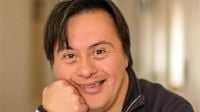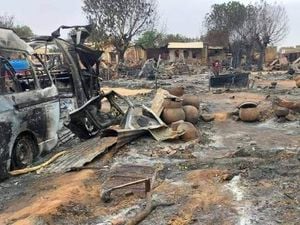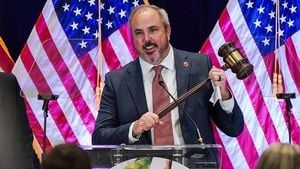Sebastián Solorza, a 43-year-old Chilean actor with Down syndrome, has long been a recognizable figure in his country’s entertainment scene. Now, he’s reaching for something far beyond the stage or screen: the presidency. As Chile’s national election looms this November, Solorza is racing against time to gather the 35,000 signatures required to officially run as an independent candidate—a challenge that has captured the attention of supporters, skeptics, and the broader public alike.
Solorza’s journey to this pivotal moment is nothing short of remarkable. According to The Associated Press, he rose to national fame after starring as Tomy in the Netflix thriller Chromosome 21, a series that quickly shot to the second spot on Netflix’s Chilean charts just two days after its 2022 debut. His performance didn’t just win over audiences; it also earned him the Best New Actor award at the 2023 Caleuche Awards, one of Chile’s most prestigious honors in the film industry. But despite his acting accolades, Solorza’s ambitions have always stretched further than the arts.
“I listen with my heart,” Solorza told The Associated Press, explaining how his unique perspective allows him to communicate differently in the often combative world of politics. He positions himself as a “point of balance” between the far right and the far left—two ideological forces currently locked in a fierce battle for Chile’s future. This, he argues, is the very reason his candidacy matters. “I’ve spent my entire life breaking down prejudices, as an actor, as a worker and as a citizen,” Solorza said during his campaign announcement. “We all deserve the same opportunities.”
At the heart of Solorza’s platform are calls for greater inclusion, improved healthcare and education, and enhanced security—issues that resonate deeply with many Chileans. The country has been grappling with an unprecedented crisis of violence in recent years, making security a top concern for voters. But Solorza’s campaign isn’t only about policy; it’s about representation. He hopes his run will shine a spotlight on the capabilities and rights of people with Down syndrome and other disabilities, challenging the prejudices that linger in Chilean society.
His campaign, however, faces daunting odds. With the August 18 deadline fast approaching, Solorza has collected just over 600 signatures—far fewer than the 35,000 required to appear on the ballot. Yet, he remains undeterred. As he told his supporters, “I know my candidacy would be uncomfortable for many. But I am here to support minorities.” Even if he falls short of the official threshold, Solorza views his political foray as a success in itself, a step toward greater visibility and acceptance for people like him.
The broader political landscape in Chile is, to put it mildly, polarized. The upcoming presidential election, set for November 16, 2025, is shaping up to be a showdown between two familiar names: José Antonio Kast, the far-right contender who narrowly lost to current leftist president Gabriel Boric in 2021, and Jeannette Jara, the ruling coalition’s communist nominee. Polls suggest that these two will advance to a second-round runoff on December 14, setting the stage for yet another ideological clash. In this context, Solorza’s self-described centrist approach offers a rare alternative—a “middle ground between political extremes,” as he puts it.
Despite the uphill battle, Solorza’s campaign has sparked real enthusiasm on the ground. In the leafy northern Santiago neighborhood of Huechuraba, he’s a familiar sight, always ready with a smile and never too busy for a photo or a chat. Supporters have rallied behind him, offering words of encouragement as he makes his rounds. “Good luck with the signatures,” one supporter wished him last week, according to NBC Miami. “Let it be the people who ultimately decide our future.” In Valparaíso, the coastal city where Chile’s Congress is based, citizens have shown up at Parliament to express their backing as well.
Solorza’s campaign is about more than signatures and speeches; it’s about demystifying myths and prejudices. Carolina Gallardo, director of the Down Up Foundation—a Chilean nonprofit supporting families of children with Down syndrome—believes his candidacy could “raise the voices of people with Down syndrome” and help “demystify myths and prejudices still present in society.” For many, Solorza’s visibility alone is a powerful statement against exclusion and misunderstanding.
His path to politics has been anything but conventional. Born in the 1980s, a time when understanding of Down syndrome was limited in Chile, Solorza’s early years were marked by uncertainty. His mother, Jenny Solorza, remembers those days as “very dark,” recalling how doctors failed to provide a clear diagnosis. The family took matters into their own hands, seeking out information and support wherever they could. Music became an anchor for Sebastián, shaping his worldview and fueling his passion for the arts. “Sebastián has a very broad musical culture, and that’s what he grew up with,” Jenny told The Associated Press.
Solorza attended special schools, where he was encouraged to pursue his artistic interests rather than traditional academics. By 18, he’d earned a scholarship to a theater school and began performing on stage and television. His rise was gradual but steady, culminating in his breakout role in Chromosome 21. The series follows a detective investigating whether a young man with Down syndrome found at a crime scene is a witness or a suspect—a storyline that resonated with viewers and critics alike.
Balancing his acting career with a day job at a construction company, Solorza’s schedule is nothing if not packed. Yet, he still finds time to visit Congress, meet with legislators, and talk with constituents about his vision for Chile. His campaign, while modest in resources, is rich in meaning. For many Chileans, Solorza’s effort is a reminder that politics need not be the exclusive domain of the powerful or the well-connected.
Of course, not everyone is convinced. Social media critics have questioned his preparedness and lack of political experience. But Solorza is no stranger to doubt. “I’ve spent my entire life breaking down prejudices,” he repeats—a refrain that, for him, is more than a slogan. It’s a lived reality.
Whether or not Sebastián Solorza manages to secure the signatures needed to run, his candidacy has already made an indelible mark on Chile’s political conversation. By stepping forward, he’s forced the country to reckon with questions of inclusion, representation, and the true meaning of democracy—questions that will linger well beyond this election cycle.





